On the occasion of the centennial of the founding of the party, there are fewer and fewer tribute films, and the first shot in this special slot is Huang Jianxin’s “1921”, who carried “The Founding of a Republic”, “Beginning of The Great Revival” and other melodramatic films in the last decade.
In fact, for most Chinese people, the story of the history that happened a century ago is very “simple and clear”, but at the same time, it is not easy to tell that story well, and different aesthetics of the times and the social environment doomed this kind of subject matter can always be made new.
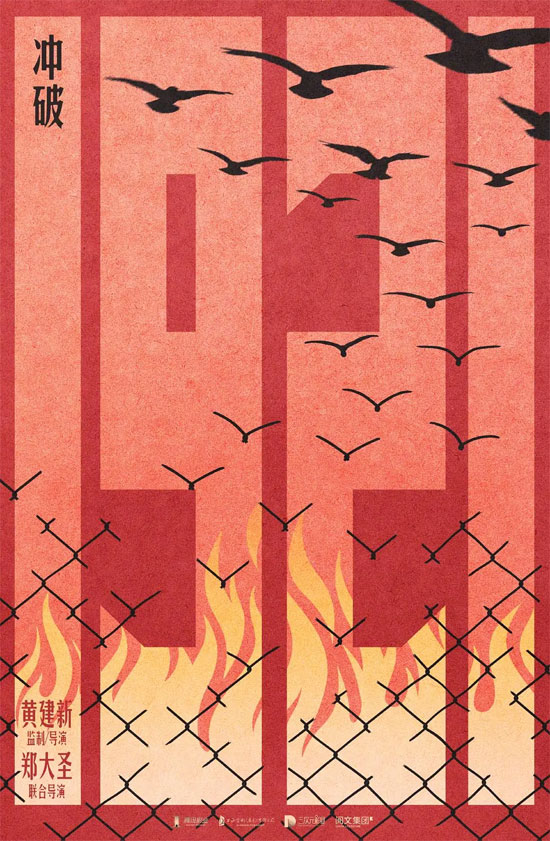
Frankly speaking, the initial viewing experience of 1921 is not too good. The main story line is not strong enough, and there are many and varied subplots, which tends to make the viewer fall into a sense of “fragmentation” and confusion, and even though the design of the movie is very well thought out, it still fails to be executed thoroughly.
Of course, this movie is not bad at all, because it contributes a new possibility in the environment of domestic melodramas (involving important historical figures), which are becoming more and more similar, and this innovation really let me see some lightness and heaviness of history.
[Friendly reminder: there will be spoilers below].
Unlike Huang’s previous film “Party Building”, “1921” chooses the First Congress of the Communist Party of China (CPC) as its starting point, focusing on the preparations for and convening of the First Congress, as well as other details. -However, the movie does not forget to add a running background to this “slice”, including the causes of China’s humiliating modern history, as well as the aftermath of the Second Congress and the founding of New China.
Although the main event of 1921 is a meeting between 13 members of the Party and two representatives of the Comintern, the movie is rich in characters and scenes.
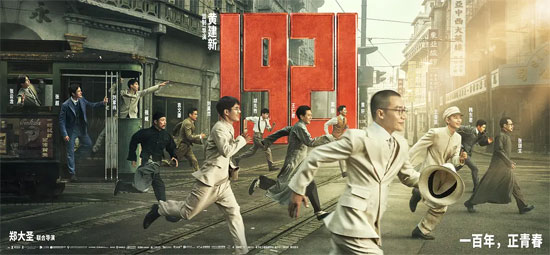
Chen Duxiu and Li Dazhao became a supporting role this time, Sun Yat-sen and Song Qingling and others just flashed by, Chiang Kai-shek, Huang Jinrong and others were not able to fight …… but each of them, appeared in their own position that should appear.
In addition to Beijing, Guangzhou, Shanghai, Changsha and other places, Vienna, Paris, Tokyo, Moscow and other cities also appeared in the film one after another, both the domestic student movement, the workers’ movement of the ups and downs, but also abroad the treacherous undercurrents, and its rare international vision from the side of the Chinese Communist Party’s founding and the world situation is closely linked.
Unfortunately, “1921” is a bit rich “over the top”, so that it will always fall into a kind of mess from time to time: for example, the story line related to the Japanese special high division is really dispensable, and the “spy drama” related to Marin and Nicholsky seems to have enriched the movie genre. Elements, in fact, is to make the content of the film more mixed …… This can be said to be the biggest minus point of the film.
Among the many “tall, short, fat, thin, long and short” story lines, “1921” chose Li Da and his wife Wang Huiwu to carry the main line, which is a very fresh and ingenious perspective.
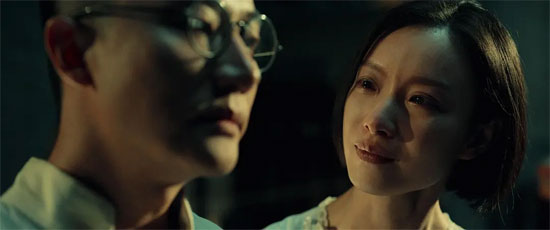
For one thing, as organizers of the conference, Mr. and Mrs. Lida do have the credentials to tell the story throughout;
Secondly, compared with other participants who have had their own ups and downs, Li Da, who focuses more on theoretical and academic research, is not “particularly well-known”, which means that there is more room for narrative;
Thirdly, this pair of newlywed progressive young people, who step by step contributed to the successful convening of the “Great Congress” in the midst of their lives, and their spirit of family and country and responsibility, in itself fits the theme of the movie very well.
In the middle and late stages of the movie, the effectiveness of the multiple narratives of “1921” slowly appeared (but unfortunately a little late) – representatives from all over the world gathered in Shanghai, ready to go, the most important point is that they are a living person, different ages, different origins, different backgrounds, and even different political views, but they can be motivated by the same kind of ideas. They are all of different ages, different origins, different backgrounds, and even different political views, but they can all be motivated by the same kind of ideas and work together to create a brand new China.
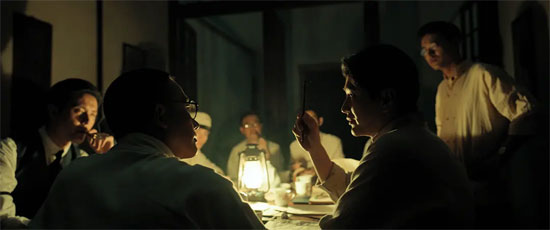
After the conference (with its multiple story lines), the smoothness of 1921 improves dramatically, not only because of the aforementioned “freshness”, but also because the return to a normal narrative is more indicative of the film’s nature as a “drama” rather than a “historical film”. The film’s nature as a “drama” rather than a “historical movie” is more apparent when it returns to its normal narrative.
Yes, “1921” is a second creation that cuts across the history related to the “Big One” and then re-processes it, with less solemn and solemn historical facts and more romantic and vivid humanistic atmosphere, and this kind of modification does not abandon the root and pursue the end, but rather makes new attempts within the controllable scope.
Let me talk about what I appreciate most about “1921”: it tries, and to some extent, shoots out the contingency and inevitability of history, which is specifically manifested in the fact that the “Big One” looks incredibly important in the movie, but it seems that it is not “so important”. In the movie, “The Big One” seems to be extremely important, but not “that important”.
In order to convey this feeling, we have to rely on the flesh-and-blood participants, especially those “marginalized people” who are not well known or not so well known later on.
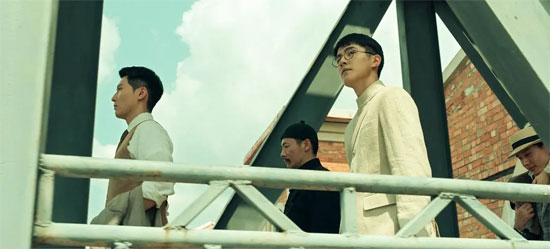
For example, Liu In-jung, the youngest of the 13 delegates, was only 19 years old at the time, but he was a standard young man after the age of 00, actively involved in leading the May 4th student movement, and was sent to Shanghai to participate in the conference because of his outstanding academic ability, so he was a real star of the future.
The movie shows Liu Renjing as a young and energetic young man, but at the same time, the movie also lets him express his idealistic side, which is not a good or bad trait at that time.
But combined with his later experience as a Trotskyist and his defection to the Kuomintang, Liu Renjing’s youthful vigor at this time is saddening. ……
More typical is Chen Gongbo and Zhou Fohai, who left the party not long after the end of the First National Congress, and later became traitors, and both died in vain – the movie designed a dramatic appearance for these two men: each of them brought a female companion, and met (mainly to play a role) in front of the window of a red light shop. meet up (mainly for fun and a side meeting).
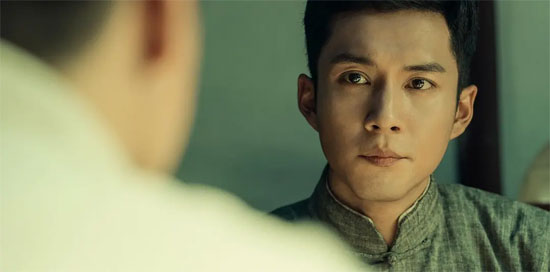
Although 1921 doesn’t have much to say about these two men, the few small close-ups that do exist are very evocative, such as Zhou Fohai’s failure to attend the last meeting because he had diarrhea from eating too much ice cream, reflecting his lack of firmness, and Chen Gongbo’s skipping of the closing meeting at the Nanhu Lake in Jiaxing, which also implies that he had wavered in his communist ideology.
As for the other positive participants, they are quite understandable: the scholarly and vigorous Li Da, the world-minded and determined Mao Zedong, the outwardly rounded and inwardly square He Shuhang, etc. (By the way, the 19th Congress of the People’s Republic of China is a good example of the lack of a strong mind.
(By the way, the best actor in 1921 is Zhang Songwen/He Shuhang, the worst is Chen Kun/Chen Duxiu, who thankfully doesn’t have much to do …… )
Of course the First Congress of the Communist Party is incredibly important, but the point of all this is to show that in 1921, in a time when ideas were coming and going, when associations were being formed and disbanded on a daily basis, the birth of the Communist Party of China didn’t seem to be that important, and the first delegates included all sorts of people, and no one dared to say what the future of the revolution in China was going to be like… …The “contingency” of history is evident in these participants.
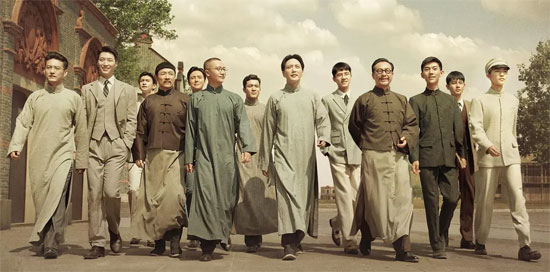
However, if you think about this layer, you will once again more deeply realize how difficult and important the “First Congress” is, the Chinese Communists chose Marxism-Leninism and developed their own Marxism-Leninism, not to mention that the delegates of the “First Congress” also included the greatest legend of China in the past hundred years, who was the most important person in China. Not to mention that the delegates to the “First Congress” also included the greatest Chinese legend of the millennia …… History contains a certain “inevitability” in its countless contingencies.
–Unfortunately, the above flavor is more of my own brain, “1921” just in this “sense of history” on the beginning, but can not do the corresponding implementation and realization, for example, at the end of the still only named a few of the revolution in the process of the sacrifice of a large number of delegates. For example, at the end of the book, only a few representatives who died during the revolution are mentioned. It would have been better if a few people with a bad reputation were also mentioned, so as to strengthen the uncertainty and certainty of “passing from people to time”.
Finally, I would like to talk about two of my favorite scenes, one is when Li Da sees the little girl on the opposite side of the window/rooftop several times, without any lines, but through the movements and smiles of both sides, it can constantly convey the fighting power of “family is the smallest country, country is a multimillion family”.
In another section, Mao Zedong is stopped outside the French Concession, watching the joyous foreigners celebrating and rejoicing, Mao Zedong’s initial reaction is a furious glare, and then when he turns his head to see the brilliant fireworks, he turns into a calm thoughtfulness, and then starts to run without stopping, without stopping.
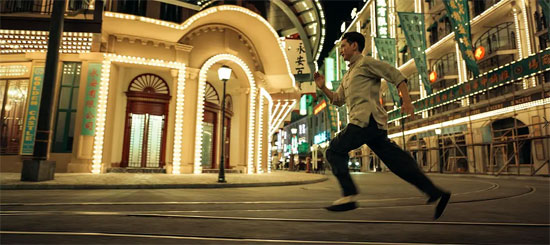
The same no lines, the same with the look and body language to complete a metaphor and indication, this running with youthful righteousness, said a hundred years ago under the obscurantist environment of the young but firm pace.
1921″ is not a good melodrama movie, but it gives a new way of thinking, and we always need such innovation, because history is the present, and the present is also a new history.
Please specify:Anime Phone Cases » 1921 2021 Film Review: Contingencies and Inevitabilities of History